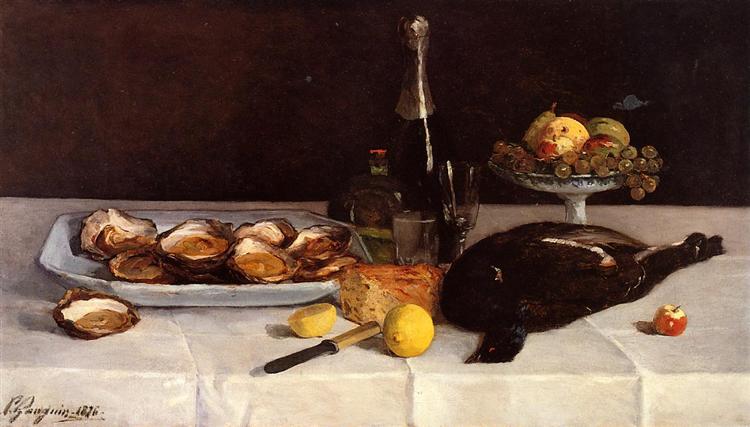Beschreibung
Die Arbeit "Bodegón mit Austern" (1876) von Paul Gauguin wird als ein klares Beispiel für den Übergang vom Realismus zur Symbolik errichtet, den sein Autor in seinen frühen Jahren als Maler lebte. In diesem Stillleben erfasst Guguin nicht nur die Einfachheit von Objekten, sondern auch eine tiefere Essenz, die den Betrachter einlädt, über die Beziehung zwischen Natur und Kunst nachzudenken, die oft als Dialog über die Sinnlichkeit des Alltags angesehen wird.
Die Komposition konzentriert sich auf ein Gericht mit frischen, majestätischen Austern in ihrer Präsentation, die in einer Umgebung mit großer Einfachheit und Sparmaßnahmen arrangiert werden. Bodegón -Elemente sind mit einem fast rituellen Sinn organisiert, in dem jedes Objekt seine eigene Bedeutung zu haben scheint und eine fast mystische Aura ablenkt. Die Vertikalität des Gerichts wird durch die Horizontalität des Tisches entgegengewirkt, wodurch ein Dialog zwischen Formen erzeugt wird, die die Singularität von Austern hervorhebt und die Betrachtung seiner Textur und Helligkeit einlädt. Diese Betreuung des zentralen Objekts verstärkt die Meisterschaft von Gauguin als Direktor seiner Werke und schafft einen Interessenschwerpunkt, der nicht nur durch das dargelegte Objekt angegeben ist, sondern auch durch den Kontext, in dem es sich befindet.
Die Verwendung von Farbe in "Bodegón mit Austern" ist besonders bemerkenswert. Gauguin entscheidet sich für eine Palette, die irdische Töne kombiniert, die die Organizität der Elemente verstärken, während das Weiß und das Grau von Austern von einer fast ätherischen Leuchtkraft hervorstechen. Diese chromatische Wahl ermöglicht nicht nur eine realistische Darstellung von Objekten, sondern schlägt auch breitere Bedeutungen wie Fragilität und kurzes Vergnügen vor, das mit dem Akt des Essens verbunden ist. Das weiche Licht, das die Szene badet, scheint von einer natürlichen Quelle zu stammen und so die subtile Verbindung zwischen dem Inneren des Hauses und der Außenwelt zu unterstellen, ein wiederkehrendes Thema in Gauguins Arbeit.
In diesem Gemälde gibt es jedoch keine menschlichen Charaktere. Das Fehlen von Figuren, die mit diesen Objekten interagieren, konnten als persönliche Meditation von Gauguin über Kunst und Natur selbst interpretiert werden, ein Zustand der Kontemplation, in dem der Betrachter der einzige ist, der der Szene durch seine eigene Interpretation das Leben geben kann. Diese Einsamkeit "bewohnt" von Objekten führt den Betrachter, aktiv an der visuellen und emotionalen Erfahrung teilzunehmen, die aus der Arbeit ausgeht.
Durch "Bodegón with Austern" zeigt Gauguin nicht nur seine Fähigkeiten als akribischen Beobachter, sondern lädt auch eine Erforschung der reichen Symbologie ein, die im Alltag zu finden ist. Das Werk spiegelt einen Moment wider, in dem der Künstler auch in seinen frühen Tagen begann, die tiefsten Fragen über die Bedeutung von Kunst und seine Fähigkeit zu sehen, Emotionen hervorzurufen. Als solches wird es zu einem Vorläufer seines nachfolgenden Stils, in dem die Intensität der Farbe und Vereinfachung von Formen in ihrer Suche eine stärkere Bekanntheit einnehmen würde, um nicht nur die Realität, sondern auch die Träume und Visionen einer lebendigeren und bedeutenderen Welt auszudrücken.
Dieses Stillleben mit seinem scheinbar einfachen Charakter verwandelt sich somit in ein visuelles Experiment, das die Komplexität des Lebens selbst und die kurzlebige Natur der Vergnügen entlarvt und die Meisterschaft von Gauguin bei der Schöpfung einer visuellen Erzählung bestätigt, die an Symbolik und Emotion reicht.
KUADROS ©, eine berühmte Farbe an Ihrer Wand.
Handgefertigte Ölgemälde, mit der Qualität professioneller Künstler und dem unverwechselbaren Siegel von KUADROS ©.
Pictures Reproduction Service mit Zufriedenheitsgarantie. Wenn Sie mit der Nachbildung Ihres Gemäldes nicht vollständig zufrieden sind, erstatten wir Ihr Geld zu 100%.

